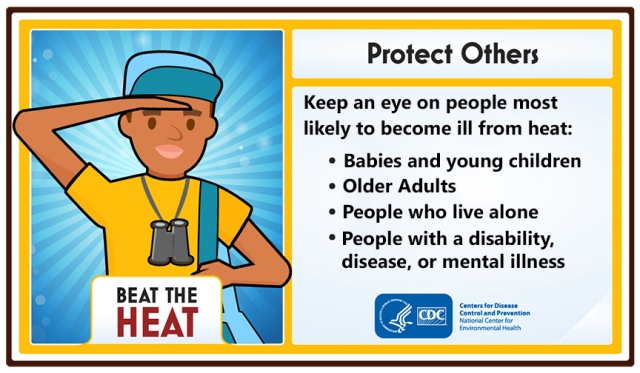 We’ve already seen triple-digit temperatures across Idaho this summer along with emergency room visits for heat exhaustion, so it’s a good time to take note of how to avoid heat-related illness in the hottest summer months. Heat-related illnesses and deaths are preventable.
We’ve already seen triple-digit temperatures across Idaho this summer along with emergency room visits for heat exhaustion, so it’s a good time to take note of how to avoid heat-related illness in the hottest summer months. Heat-related illnesses and deaths are preventable.
Who is most at risk for heat-related illness?
People at the highest risk are babies and children up to age 4, people 65 and older, as well as anyone who is overweight, sick, or on certain medications. People without air conditioning, athletes, and outdoor workers are also at high risk of heat-related illness. Children are particularly at risk in the heat – their bodies heat up three-to-five times faster than adults. But everyone can get sick in the heat if they’re not careful, especially if they’re doing strenuous physical activities in high temperatures. When it’s hot out, you might consider checking on family, friends, and neighbors to make sure they are staying cool.
Are there other factors that put us at risk?
A number of things can make it more difficult for your body to keep cool, including age, obesity, fever, dehydration, heart disease, mental illness, poor circulation, and even sunburn. A cold beer in the heat of the day might sound like a good idea, but it’s not. Drinking alcohol in hot weather can make it harder to keep cool. Water works best to cool your body down.

What are the best ways to stay hydrated?
On hot days, you should drink more water than normal regardless of your activity level. If you feel thirsty, you are already dehydrated. Avoid alcohol and sugary beverages and encourage your friends and family to do the same. Plan to drink 2-4 glasses of water each hour if you are working or exercising outside. Drink enough so that your urine is a normal amount and color each time you go to the bathroom.
What are some signs of heat-related illness?
Signs of heat exhaustion include dizziness, heavy sweating, a pale skin tone, muscle cramps, nausea or vomiting, and headache. If you get to the point where you have a very high body temperature, are not sweating, and are experiencing hallucinations or disorientation, or you pass out, you may have heat stroke. Call 9-1-1 right away and take immediate steps to cool down.
How can we stay cool?
Plan your biking, hiking, gardening, and other outdoor activities in the morning, when it’s cooler. Otherwise, stay inside air-conditioned buildings whenever you can; in extreme heat, a fan won’t be enough. If you don’t have air conditioning in your home, head to a public building that does: the library, a shopping mall, or movie theater would do the trick. Wear lightweight, light-colored clothing. If you feel overheated, take a cool shower or bath to bring your temperature down.

Anything else?
Please remember to never, ever leave a child or pet alone in a parked car when it’s hot out. On average, every 10 days in the U.S. a child dies from heatstroke in a vehicle. The interior temperature of a vehicle can increase 19 degrees in 10 minutes, which can create very dangerous conditions for children and pets who can’t open a window or get out of the vehicle when they get uncomfortable.
A Closer Look at Your Health airs weekly on KBOI 670 AM in Boise; this is a transcript of the July 17, 2018 program.
Resources:
- CDC’s tips for preventing heat-related illness: https://www.cdc.gov/features/extremeheat/index.html
- Heatstroke prevention from Safe Kids Worldwide: https://www.safekids.org/heatstroke
- Resources for employers:
https://www.osha.gov/SLTC/heatstress/heat_illnesses.html - Urine color chart https://gacc.nifc.gov/nwcc/content/pdfs/safety/DOD_Urine%20Color%20Test_Poster.pdf
